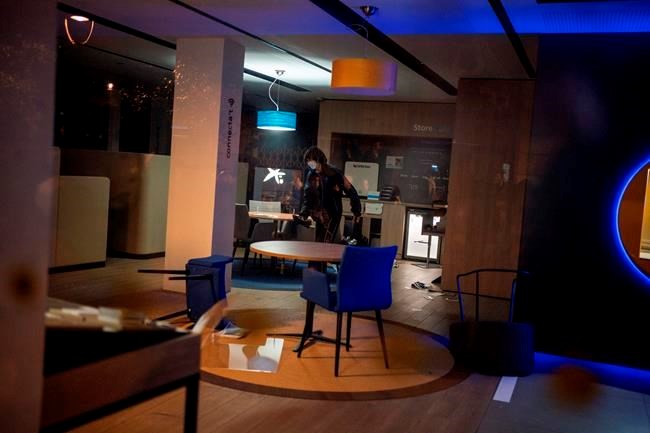BARCELONA, Spain — Street protests over the imprisonment of a rapper turned violent for a fourth straight night in Spain on Friday, as political responses to the disturbances strained relations inside the country's coalition government.
Police in the northeastern region of Catalonia, which has seen most of this week's rioting, said some protesters pelted officers with bottles, stones, fireworks and paint in Barcelona and at least three other places. Other protesters set fire to large street trash containers and used them to block streets.
In downtown Barcelona, some people broke into two bank branches and tried to set a fire inside, while others vandalized and ransacked stores, police said. In Girona, another Catalan city, protesters smashed the windows of three banks.
Thousands of people joined the marches, but the violence appeared to come from a smaller group.
The pitched battles raged hours after Spanish Prime Minister Pedro Sánchez said the violence is “inadmissible,” in comments that accentuated a rift with his coalition government’s junior partner.
In impromptu remarks at the start of a speech about the economy, Sánchez addressed the rioting this week that has ignited a heated debate over the limits of free speech in Spain and a political storm over the use of violence by both the rapper’s supporters and the police.
“Violence is an attack on democracy,” Sánchez said, “and the government will take a stand against any form of violence to ensure people’s safety.”
Interior Minister Fernando Grande-Marlaska also stepped into the row, thanking police for their efforts and saying they would continue to “guarantee the rights and freedoms of all society against a minority whose misguided idea of rights makes them have recourse to violence.”
Around 80 people, including four on Friday night, had been arrested and more than 100 injured since rapper Pablo Hasél earlier this week was arrested and began to serve a 9-month prison sentence after his conviction for insulting the Spanish monarchy and praising terrorist violence.
Sánchez and Grande-Marlaska belong to the Socialist party, which heads the coalition government. Senior members of the coalition’s junior partner, the far-left United We Can (Unidas Podemos) party, have spoken out in support of the protesters and criticized police after a protester lost an eye, allegedly due to a foam bullet fired by riot police.
On Thursday, the party filed a petition for a “total pardon” for Hasél and another rapper, Valtònyc, who fled to Belgium in 2018 to avoid trial on charges of “glorifying” terrorism.
Many people, including artists, celebrities and politicians, have expressed support for a change in the country’s so-called “Gag Law” covering freedom of expression.
The government unexpectedly announced last week that it would change the law to scrap prison terms for
___
Associated Press journalist Hernán Muñoz reported this story in Barcelona and AP writer Barry Hatton reported from Lisbon, Portugal.
HernáN MuñOz And Barry Hatton, The Associated Press

